
IRIS login | Reed College home Volume 92, No. 3: September 2013
Into the Stacks
Photos and interviews Jenn McNeal ’14
All libraries hold books. But the Reed library also holds students—specifically, the seniors who take up virtual year-round residence at their thesis desks. At the behest of Reed magazine, I ventured deep into the stacks to document the lives and theses of a handful of Reed seniors from the Class of ’13.
![]()
Into the Third Dimension
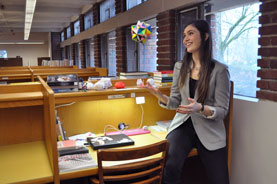
Clara Redwood
Major: Mathematics
Hometown: Buffalo, NY
Adviser: Prof. Irena Swanson
Number of books currently checked out: 18
Thesis: Mathematical folding algorithms
My thesis explores curved folds and how they can be used to create curved 3-dimensional objects. I am in the process of writing an algorithm that prints out an origami pattern on paper that uses both curved and straight folds to create a mathematically accurate ellipsoid.
The easiest way to think about folding algorithms is to think about the solar panels on a space shuttle or satellite. The solar panels need to fold down into a small space for take-off and then, once the ship is in space, unfold into a sheet with giant surface area to absorb the most energy from the sun. This process, and the refolding than occurs when the ship comes back to earth, is all the result of carefully executed mathematical folding algorithms.
My thesis desk is my favorite study spot. The basement of the library is just cool enough to keep me awake and just quiet enough to keep me focused. But more importantly it’s empty enough for me to spend hours nosily cutting and folding paper without bothering anyone!
Sex and Surgery
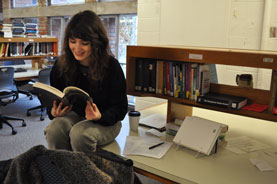
Taylor Calamity Thompson
Major: Anthropology
Hometown: Los Angeles, CA
Adviser: Prof. Charlene Makley
Number of books currently checked out: 16 (I have $9.20 in unpaid fines)
Thesis: Sex reassignment surgical tourism in Thailand.
I’m writing about people from Western nations traveling to Thailand to get sex changes. Right now I’m exploring the online advertisements that the Thai Tourism Authority directs toward a Western transgendered audience, marketing Thailand as a destination for sex reassignment surgery. In doing so, the Thai state deploys familiar images of the Asian exotic—particularly Thailand's "anything goes" approach to sexuality and how “acceptable” it is to be transgendered in Thailand—in a sort of self-Orientalizing move. What is at stake is that gender and sexuality are, in fact, incredibly contested and multifaceted in Thailand; in the process of commodifying itself as a destination for Western queer tourism, Thai personhoods, individualities and sexualities are simplified and stereotyped.
If I’m truly trying to crack down, I like to work at my thesis desk and at the brightly lit desks by the social science texts. But if I want to goof off under the guise of doing homework, Spielman Coffee Roasters on Division Street is my jam.
My deskmate is Amy Egerton-Wiley. She’s a Chinese literature major and one of the hardest working, most involved people I know at Reed. I've wanted her as my desk partner since junior year because I knew I'd be less likely to slack off if she was reading virtuously next to me. She’s like the angel on my shoulder—the guy across from me is a different story.
![]()
The Madness of Crowds
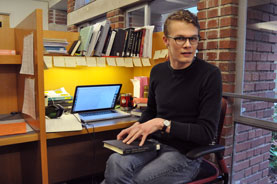
Rodney Mastick
Major: Psychology.
Hometown: Santa Rosa, California.
Adviser: Prof. Kathy Oleson.
Number of books currently checked out: 23
Thesis: Collective flight behavior.
"Collective flight behavior" is pretty much just a fancy term for the way people behave in emergencies or disasters that demand the escape from a particular space or area. I’m following up on a series of studies on the social identity model of collective flight behavior published a few years ago. Specifically, I’m looking at whether or not the way people think about and behave toward others in the crowd during the course of evacuations is influenced in any way by how ambiguous the situation and the threat precipitating the evacuation are. The prediction, based on the research already out there on ambiguity and human psychology, is that as the cues that tip people off to what is going on communicate more and more unclear information, people will be less likely to behave prosocially toward others and more likely to actively compete with them for access to escape routes. If we end up finding a significant effect, we’ll be able to better predict the way collective flight events play themselves out, with the ultimate goal of mitigating the danger inherent in those events and enhancing cooperation between evacuees in a way that makes loss-of-life and injury less likely to occur.
If people know more about the danger they are in when a part of a disaster situation, will they be less likely to “panic” and devolve into “mass hysteria” in the way they do when confronted by such events in the movies.
![]()
Adam and Yves
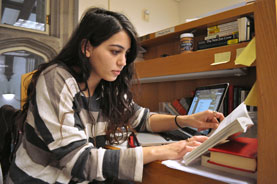
Eva Gabor
Major: French Literature
Hometown: Tahiti, French Polynesia/ Santa Monica, CA
Adviser: Prof. Hugh Hochman
Books checked out: 21
Thesis: Poetry as place and the function of the dream in the works of Yves Bonnefoy
My thesis is about the French writer Yves Bonnefoy’s characterization of poetry as a space or a spectrum that uses a combination of the unconscious, uncorrupted impressions of dreams with the acknowledgement of mortality and material. It’s about how getting overly caught up either a dream-like understanding of the world or one that is purely a recognition of mortality and material reality can lead us away from our own presence and connection to our environment. For Bonnefoy, poetry should be a means by which we reach out to the “other” rather than losing ourselves in our own isolated existence.
How would you explain to your grandparents what it’s about?
It’s about the theme of the temptation to see the world through a dream-like lens, and to live life as an abstraction rather than acknowledging the heaviness and not-so-pretty reality of our own mortalities. Poetry is place where we put these two conceptions of life together to create something more meaningful.
Favorite thesis desk object? Either my headphones or my constant supply of Reed’s Ginger chews.
![]()
Watershed Moment
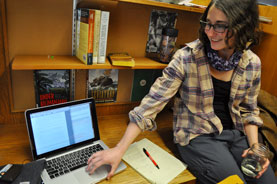
Lauren Cary
Major: Philosophy
Hometown: Asheville, NC
Adviser: Prof. Meg Scharle
Number: It’s like 35 now
Thesis: Respect for the Land: on ecosystem functioning and moral consideration
Rather than just counting humans or individual animals as ethical subjects, I'd like to make a case for the moral consideration of ecosystems as a whole.
My favorite study spot is the upper lobby of the Sports Center. No one's ever up there and I have instant access to iron, sauna, and the pool.
My favorite thesis desk object is a black lab puppet that I requested through Summit, a lending program for academic libraries in the Pacific Northwest. Moby came from Seattle Pacific University and he shares a due date with my thesis. We've spent a hellish 6 weeks together at the desk. I think morale and fluffy comfort are both legitimate academic reasons for borrowing the material.
![]()
Futurism, da.
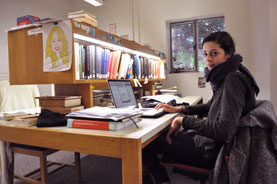
Kira King
Major: Anthropology
Hometown: Los Angeles
Adviser: Prof. Robert Brightman
Number of books checked out: 30-40… who knows?
Thesis: Image-texts and visual poetry in semiotics
I’m taking Russian Futurism as an origin point of radical linguistic and poetic experimentation, and tracing the permutations of this practice and its trajectory through the 1990s. The artists discussed belonged to a poetic tradition that presented text as image and image as text. It’s a project that is equal parts visual anthropology and semiotics; gathering visual data with a conceptually linguistic subject matter. Analyzing this data from a semiotic standpoint reveals it to be a unique visual/aural language passed on through time, with a theoretical commentary directly questioning the process of meaning-making.
How would you explain to your grandparents what it’s about?
I am looking at Russian poetry and literature from 1910-2000 that use texts to build images (like using calligraphy, color, arrangement, and other visual markers) and use images to imitate texts (presenting non-verbal material where a text would usually appear through formatting, materials, etc). While doing this I try to think about the differences and similarities between looking and reading and the types of meaning they are capable of uncovering.
![]()
Mother of Invention
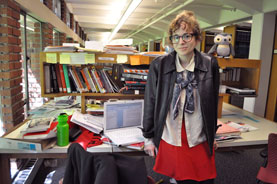
Annelyse Gelman
Major: Psychology
Hometown: Orinda, California
Adviser: Prof. Allen Neuringer, who graciously emerged (or, if you prefer, was tragically lured) from emeritus status to embark on this crazy project.
Number of books checked out: Oh God. 47 from Reed, and a bunch of Summit and ILL books. I’m reading them, I swear!
Thesis: Improvisational comedy and creative problem solving.
My thesis and synthesizes research in psychology, philosophy, anthropology, and theater to propose that learning improv – improvisational comedy – might help people perform better on tasks that require creativity. I also conducted an experiment involving various measures of creative problem-solving – word puzzles, a storytelling prompt, and generating lists of unusual items – and tested participants both before and after a beginning improv lesson to see if their performance improved. I also compared their scores to a control group, who studied instead of learning improv.
How would you explain to your grandparents what it’s about?
In improvised comedy theater, there’s no script. People make up scenes with complex plots, characters, and relationships on the spot – usually they just get a prompt word, like “mother and daughter” or “Albuquerque” or “pumpernickel,” and make up the rest as they go along. Making this performance interesting and believable involves a lot of the same skills as other kinds of creative problem-solving: focus, drawing connections between different ideas, accepting suggestions instead of criticizing them, and so on. I wanted to see if learning improv could make my participants better at problems that require creative solutions.
My advisor is Prof. Neuringer. He’d previously advised me on an experiment looking at how the unexpectedness of a joke relates to its perceived funniness, and we got together over the summer before my senior year to talk about improvisation, which fascinates both of us. Allen improvises on the piano and I improvise on stage, so we’ve been great sounding boards for each other throughout the thesis process.
![]()
(They Can't Get No) Satisfaction
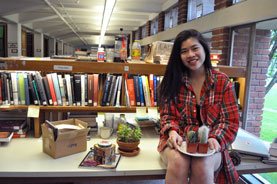
Emily Lai
Major: Political Science (the futile but humble attempt at applying the scientific method to the exciting things that happen outside of petri dishes.)
Hometown: Taipei, Taiwan.
Adviser: Prof. Jonathan Chow
Number of books checked out: Too many, probably around 60. Books read: not enough. I definitely hoarded books to gain a false sense of productivity.
Thesis: Sex Strikes
A sex strike is the collective withholding of sex, during which sex, or the lack thereof, is used as a protest and bargaining tool. It’s akin to a labor strike. My thesis is a comparative analysis of a sex strike in Liberia (2003), where it was used to protest a 14-year-long civil war; Kenya (2009), where it was used to protest political impasse in the executive branch; and the U.S. (2012), where it was used to protest Republican legislative initiatives restricting women’s access to reproductive health care. I’m attempting to answer the following questions: Why did activists use sex as a protest tool? Why were sex strikes so controversial? What were the effects of using sex as a protest tool? Will temporary sexual denial pressure men into granting concessions? Should intimate sexual and marital relations be politicized? How will activists monitor sexual abstinence when sexual intercourse typically occurs in private spaces? Do sex strikes perpetuate sexist notions that women are primarily sexual objects and that the most effective weapons women have at their disposal are their bodies and their sexuality?
The most helpful resources were my interviews with sex strike activists from Texas, Kenya, and Liberia. Thank you Skype. But in terms of books… Javier Auyero’s Contentious Lives. Sex strike activist and Nobel Peace Prize Laureate Leymah Gbowee’s memoir. And the works of Virginia Woolf, Linda Alcoff, Gayatri Spivak, Chandra Mohanty--female writers who insist with integrity that the study of “women”--as an identity, a category, a construct, and a controversy--is worth spilling ink over.
What is your favorite thesis desk object?
My plants! Thesis photosynthesis!
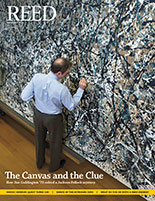
LATEST COMMENTS
steve-jobs-1976 I knew Steve Jobs when he was on the second floor of Quincy. (Fall...
Utnapishtim - 2 weeks ago
Prof. Mason Drukman [political science 1964–70] This is gold, pure gold. God bless, Prof. Drukman.
puredog - 1 month ago
virginia-davis-1965 Such a good friend & compatriot in the day of Satyricon...
czarchasm - 4 months ago
John Peara Baba 1990 John died of a broken heart from losing his mom and then his...
kodachrome - 7 months ago
Carol Sawyer 1962 Who wrote this obit? I'm writing something about Carol Sawyer...
MsLaurie Pepper - 8 months ago
William W. Wissman MAT 1969 ...and THREE sisters. Sabra, the oldest, Mary, the middle, and...
riclf - 10 months ago